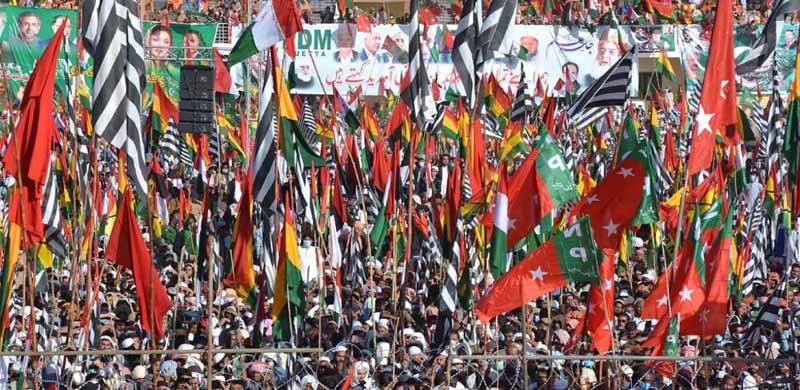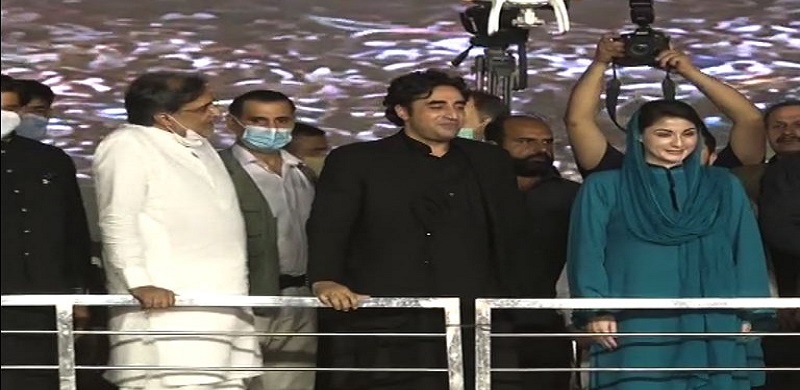
The verbal fireworks and street power unleashed by Pakistan’s opposition alliance has put Prime Minister Imran Khan’s crisis-prone government on the defensive. Casting the spotlight on Khan’s unfitness to rule and on the interference of the powerful military and intelligence services in the political process is a bold but risky strategy by the opposition.
The opposition can tap the misery and disillusion felt by many Pakistanis because of a slowing economy, high inflation, growing unemployment, and spiking poverty to build a case against Khan’s leadership. But it is much harder to gain political mileage from denouncing the military establishment for political engineering in Khan’s favor. That is because opposition leaders themselves have gained from military tutelage in the past.
To his credit, Khan came to power in 2018 without carrying the baggage of corruption. His rallying cry was to bring about seismic change, good governance, and end political patronage. He pledged to create an Islamic welfare state to address endemic poverty. But governance crises and partisan politics have taken a toll on Khan’s government. As the anemic economy deteriorates, Khan obsesses over the perennial issue of Kashmir with India and with Islamophobia in the West (the latest flap with France is an example)
In the effort to sway public sentiment to get rid of Khan, the opposition has to present itself as a credible alternative. But it is hard for the opposition to get rid of the view, held by many, that they are a motley group of failed politicians dogged by corruption scandals. Based on its record, it is in no position to promise better governance and decisive reform that the country desperately needs.
However, any opposition is better than none. Despite its dysfunction, Pakistan has enjoyed blips of genuine democracy. The sizeable crowds in opposition show that there is little support for turning Pakistan into a “pseudo-democracy”, a de facto one-party state with stability based on soft authoritarianism. Furthermore, charges that the ruling establishment is undermining democratic institutions, restricting free and fair elections, and attempting to gag the press are resonating with the public.
By dragging the military establishment into the political fray, the opposition is putting the heat on Khan’s key base of support. It is hoping that the military, sensitive to shifting public sentiment, could decide to abandon Khan. But by naming and shaming the military brass for political maneuvering and bringing up human rights abuses attributed to the military in the sensitive province of Baluchistan, the opposition risks increasing the ire of the military establishment.

While the military wants to avoid the succession of past military takeovers, a short period of direct military rule is possible to find a suitable civilian replacement if Khan fails to deliver. To avoid this grim scenario, democratic leaders must choose the route of dialogue, consensus, and compromise over confrontation, chaos, and violence. Unfortunately, they have failed this test in the past.
Despite the latest political challenge, the most likely scenario is that the system of hybrid democracy in Pakistan will muddle along. It works in a manner: establishment approved politicians with limited power take turns as leaders, elite manipulation and corruption are widespread, vision-less bureaucrats advise on domestic economic policies and oversee a bankrupt economy with a bloated defense budget and heavily dependent on foreign loans, and the military keeps a lid on domestic unrest and controls security and foreign policies.
However, just muddling along isn’t the long-term solution for a strategic nuclear-armed, medium-sized country of over 200 million people, with a fast-growing population. Rising poverty, low tax generation, the lack of basic services, the unfairness of the elite system, and the unresponsiveness of public officials increase the divide between the ‘haves’ and the ‘have-nots’ that extremists will exploit.
The fact is that Pakistan needs: more authority to elected politicians, less military meddling, less dependence on patrons like the United States and China, better relations, and more trade with Asian neighbors, particularly India, a reversal of elite capture, an independent civil society, and more power to voters.
Whether it is a success or failure, the opposition challenge is an essential part of a vibrant democratic process. Moreover, the re-invigoration of democracy by strengthening political and judicial institutions and not more authoritarian measures are the key to combating rising religious intolerance and national insecurities.
Preserving and strengthening democracy in Pakistan is vital for peace in the region and beyond.
(This article was first published in The Globe Post on December 16, 2020)
The opposition can tap the misery and disillusion felt by many Pakistanis because of a slowing economy, high inflation, growing unemployment, and spiking poverty to build a case against Khan’s leadership. But it is much harder to gain political mileage from denouncing the military establishment for political engineering in Khan’s favor. That is because opposition leaders themselves have gained from military tutelage in the past.
To his credit, Khan came to power in 2018 without carrying the baggage of corruption. His rallying cry was to bring about seismic change, good governance, and end political patronage. He pledged to create an Islamic welfare state to address endemic poverty. But governance crises and partisan politics have taken a toll on Khan’s government. As the anemic economy deteriorates, Khan obsesses over the perennial issue of Kashmir with India and with Islamophobia in the West (the latest flap with France is an example)
In the effort to sway public sentiment to get rid of Khan, the opposition has to present itself as a credible alternative. But it is hard for the opposition to get rid of the view, held by many, that they are a motley group of failed politicians dogged by corruption scandals. Based on its record, it is in no position to promise better governance and decisive reform that the country desperately needs.
However, any opposition is better than none. Despite its dysfunction, Pakistan has enjoyed blips of genuine democracy. The sizeable crowds in opposition show that there is little support for turning Pakistan into a “pseudo-democracy”, a de facto one-party state with stability based on soft authoritarianism. Furthermore, charges that the ruling establishment is undermining democratic institutions, restricting free and fair elections, and attempting to gag the press are resonating with the public.
By dragging the military establishment into the political fray, the opposition is putting the heat on Khan’s key base of support. It is hoping that the military, sensitive to shifting public sentiment, could decide to abandon Khan. But by naming and shaming the military brass for political maneuvering and bringing up human rights abuses attributed to the military in the sensitive province of Baluchistan, the opposition risks increasing the ire of the military establishment.

While the military wants to avoid the succession of past military takeovers, a short period of direct military rule is possible to find a suitable civilian replacement if Khan fails to deliver. To avoid this grim scenario, democratic leaders must choose the route of dialogue, consensus, and compromise over confrontation, chaos, and violence. Unfortunately, they have failed this test in the past.
Despite the latest political challenge, the most likely scenario is that the system of hybrid democracy in Pakistan will muddle along. It works in a manner: establishment approved politicians with limited power take turns as leaders, elite manipulation and corruption are widespread, vision-less bureaucrats advise on domestic economic policies and oversee a bankrupt economy with a bloated defense budget and heavily dependent on foreign loans, and the military keeps a lid on domestic unrest and controls security and foreign policies.
However, just muddling along isn’t the long-term solution for a strategic nuclear-armed, medium-sized country of over 200 million people, with a fast-growing population. Rising poverty, low tax generation, the lack of basic services, the unfairness of the elite system, and the unresponsiveness of public officials increase the divide between the ‘haves’ and the ‘have-nots’ that extremists will exploit.
The fact is that Pakistan needs: more authority to elected politicians, less military meddling, less dependence on patrons like the United States and China, better relations, and more trade with Asian neighbors, particularly India, a reversal of elite capture, an independent civil society, and more power to voters.
Whether it is a success or failure, the opposition challenge is an essential part of a vibrant democratic process. Moreover, the re-invigoration of democracy by strengthening political and judicial institutions and not more authoritarian measures are the key to combating rising religious intolerance and national insecurities.
Preserving and strengthening democracy in Pakistan is vital for peace in the region and beyond.
(This article was first published in The Globe Post on December 16, 2020)
